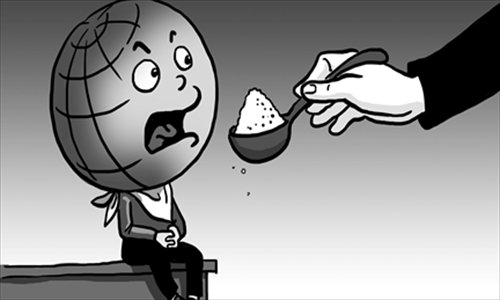Chinese role critical to keeping world from brink of hunger

Editor's Note:
Jose Graziano da Silva, director-general of the UN Food and Agriculture Organization, recently called on the international community and all players in the global food system to join together in eradicating hunger from the earth "within our lifetimes." He said meeting the challenge would mean making all food systems sustainable and distribution of food equal, noting that there are 1.5 billion people overweight and 868 million undernourished. What's the state of global food security? How can China's experiences in eliminating hunger help? Global Times reporter Wang Zhaokun talked to two experts on the issues.
Equality important
Brett Rierson, director of the World Food Programme's (WFP) China Liaison Office
There has been massive amount of focus on food production, but that is only one piece of the overall issue. There are rich countries and poor countries in the world, but they have similar income distributions in terms of the rich and the poor.
So the issue is not about the rich countries and the poor countries, it is about income disparity and equity within countries. When you have a stark income disparity and the poor spend as much as 60 percent or 70 percent of their budget on food, they will be the ones massively impacted when food prices go up.
In theory, the high food prices should be good for farmers, but in practice, only a small minority of farmers in developing countries have enough land capital to produce a significant surplus and sell them for high prices. Hindering access to the market or subsidy for biofuels will both distort the market and raise the prices.
The WFP tracks food prices globally in 60 countries around the world. We know where the assistance is mostly needed. Improvement of irrigation and yields in Africa is massively important, and could make a huge difference on global food supplies.
China's arable land per capita is one of the smallest in the world, so it is all the more impressive for them to have done such a good job in feeding their own people.
My aspiration is to help make China's greatest export its ability to solve hunger. Chinese companies investing and improving agriculture in Africa are good suppliers to the WFP.
Continuing to ensure that the actual acreage planted and farmers' rights are both protected is paramount in terms of the potential risks China faces. This will impact both Chinese and global food security and we hope the Chinese government is proactively addressing these issues.
Other issues include water, particularly in the north, where the water table continues to drop, and overuse of fertilizer.
Staple food strengths
Sally Trethewie, senior analyst of the Centre for Non-Traditional Security, Nanyang Technological University, Singapore
In coming decades, meeting the world's food needs will be a great challenge, with demand increasing, diets diversifying, competition for land and water resources intensifying, and more volatile weather conditions threatening stability.
Complex challenges need multifaceted solutions to deal with environmental, production and market issues.
On the latter, one of the key objectives is to build strength and confidence in international markets, particularly for staple foods. Rather than move toward goals of self-sufficiency, the ideal scenario would be for countries to maintain viable production in key food items but, where possible, diversify their production according to demand and comparative advantage.
The focus on food security at the multilateral level is promising, as are pledges for significant funding from the public and private sector.
However, reports suggest that less than a quarter of the $20 billion pledged by the G8 in 2009 for food security has been committed to. G8 members should reaffirm their commitment to this funding.
While the involvement of the private sector in this latest initiative is an important step, NGOs should have also been given a place at the table.
Secure tenure rights and good governance are key to safeguarding local population's use and access to land. After three years of dialogue between governments, NGOs and the private sector, a set of voluntary guidelines on international land deals was recently endorsed by the UN. The challenge is now for the 130 countries involved in the process to adapt to and implement these guidelines.
An example of good practice in China in addressing food needs is its innovative projects linking smallholder farmers with modernized food supply chains, which other countries in Asia could learn from. But significant food security goals are evidently on China's radar, as demonstrated in its domestic and foreign funding for agricultural development.
China faces substantial food security challenges in both demand and supply. Its population, growing in both number and wealth, will demand an increasingly diversified basket of food. China will be confronted by resource and environmental challenges in making this food available.
China would be best placed to diversify its agricultural production into areas in which it has comparative advantage, while building trust and strength in international markets for grain and other staples.